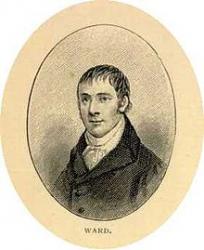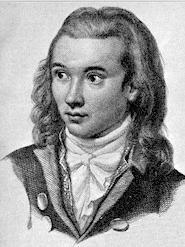Planning worship?
Check out our sister site, ZeteoSearch.org,
for 20+ additional resources related to your search.
- |
User Links
Person Results
Karl Spazier
1761 - 1805 Person Name: Spazier Composer of "ICH SAG ES JEDEM DAS ER LEBT" in Sunday-School Book Also known as Carl Spazier, Johann Karl Gottlieb Spazier, and Johann Gottlieb Karl Spazier
Karl Spazier
John Needham
? - 1786 Author of "'Tis Nature's Voice Which Reason Speaks" in The Cyber Hymnal Needham, John, was the son of John Needham, Baptist Minister, of Hitchin, Herts, but the date of his birth is unknown. He would doubtless be educated by his father, who was a tutor and in repute as a learned man. In 1750 Needham became co-pastor with John Beddome at the Baptist meetinghouse in the Pithay, Bristol; but, two years later, Beddome having retired through age, a violent controversy arose in the Church with regard to a continuance of the plan of co-pastorship. As the result, Needham and a number of his friends removed to a Baptist meetinghouse in Callowhill Street, where a Mr. Foot was pastor. For a time the two societies used the same builing at different hours, but in 1755 they were united, with Mr. Needham and Mr. Foot as co-pastors. It is known that up to 1774 this arrangement continued, and it is also known that in 1787, both Mr. Needham and Mr. Foot having died, the Callowhill Street Church became extinct, but which of the two pastors was the survivor is not known. The date of Needham's death is unknown. It was probably circa 1786. In 1768 he published Hymns Devotional and Moral on various Subjects, collected chiefly from the Holy Scriptures, &c, Bristol, S. Farley, 1768. These hymns are 263 in all, and whilst none of them possess great excellence, yet several are of a pleasing and useful character. During the past 120 years several have appeared in Nonconformist hymnbooks, and specially in those of the Baptists. Of these the following are still in common use:—
1. Ashamed of Christ! my soul disdains. Not ashamed of Christ.
2. Awake, my tongue, thy tribute bring. The Divine Perfections.
3. Glory to God, Who reigns above. Jesus, the Messiah.
4. Great author of the immortal mind. Imitation of God's Moral Perfections. From "flow matchless, Lord, Thy glories are."
5. Happy the man whose cautious steps. Christian Moderation.
6. Holy and reverend is the Name. Reverence in Worship.
7. Kind are the words that Jesus speaks. Christ the Strengthener.
8. Lord,ere [Now Lord] the heavenly seed is sown. Parable of the Sower.
9. Methinks the last great day is come. The Judgment.
10. Rise, O my soul, pursue the path. The Example of the Saints.
11. See how the little toiling ant. Youth for Christ.
12. Thou art, O God, a Spirit pure. God a Spirit.
13. To praise the ever bounteous Lord. Harvest.
14. When some kind shepherd from his fold. The Lost Sheep. From this “O how divine, how sweet the joy," in Hatfield's Church Hymn Book, New York, 1872, is taken. [Rev. W. R. Stevenson, M.A.]
--John Julian, Dictionary of Hymnology (1907)
John Needham
James Newton
1732 - 1790 Author of ""Proclaim," Saith Christ, "My Wondrous Grace"" in The Cyber Hymnal Newton, James, A.M., was born at Chenies, in Bucks, in the year 1732. At the age of 17 he went to London, where he joined the Baptist church under the care of the Rev. B. Wallin [Wallin, B,]. In 1757 he became assistant minister to the Rev. J. Tommas, pastor of the Baptist church in the Pithay, Bristol; and in 1770, classical tutor at the Baptist College in that city. He filled both these offices with honour and usefulness until his death in 1790. As a hymn-writer he is known by one hymn only, "Proclaim, saith Christ, my wondrous grace" (Holy Baptism), which appeared in 3 stanzas in the Bristol Collection of Ash & Evans, 1769, No. 381; Rippon's Baptist Selection, 1787, and others of the older hymn-books. In the Baptist New Selection, 1828; the Baptist Psalms & Hymns, 1858; the New Congregational Hymnal, 1850, and others, it begins with stanza ii.: "Let plenteous grace descend on those." In this form it is widely used. [Rev. W. R. Stevenson, M. A.]
--John Julian, Dictionary of Hymnology (1907)
James Newton
William Ward

1769 - 1823 Person Name: William Ward, 1769-1823 Author of "Oh, Charge The Waves to Bear Our Friends" in The Cyber Hymnal Ward, William, p. 453, ii., b. in Derby, 1769, and d. in India, 1821.
--John Julian, Dictionary of Hymnology, Appendix, Part II (1907)
William Ward
Johann Ludwig Huber
1723 - 1800 Person Name: Joh. Ludw. Huber Author of "Die Ernt' ist da, es winkt der Halm" in Gesangbuch mit Noten
Johann Ludwig Huber


 My Starred Hymns
My Starred Hymns



